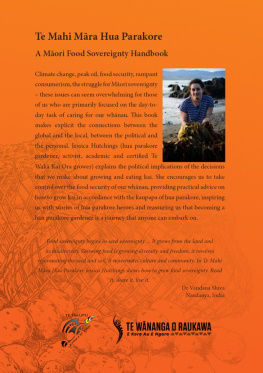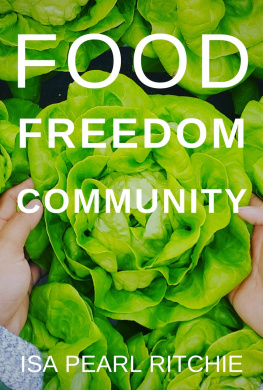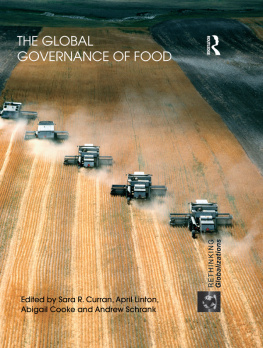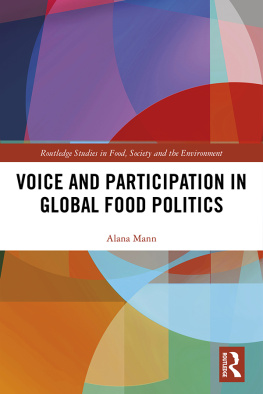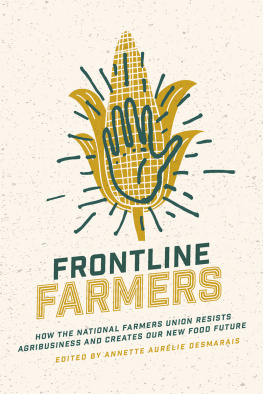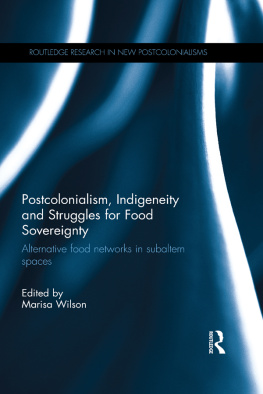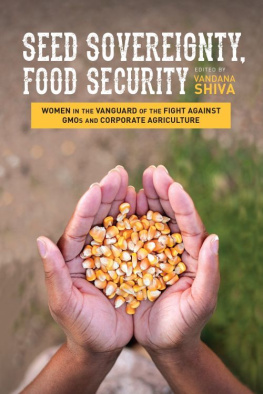We Want Land to Live
GEOGRAPHIES OF JUSTICE AND SOCIAL TRANSFORMATION
SERIES EDITORS
Nik Heynen, University of Georgia
Mathew Coleman, Ohio State University
Sapana Doshi, University of Arizona
ADVISORY BOARD
Deborah Cowen, University of Toronto
Zeynep Gambetti, Boazii University
Geoff Mann, Simon Fraser University
James McCarthy, Clark University
Beverly Mullings, Queens University
Harvey Neo, National University of Singapore
Geraldine Pratt, University of British Columbia
Ananya Roy, University of California, Berkeley
Michael Watts, University of California, Berkeley
Ruth Wilson Gilmore, CUNY Graduate Center
Jamie Winders, Syracuse University
Melissa W. Wright, Pennsylvania State University
Brenda S. A. Yeoh, National University of Singapore
We Want Land to Live
We Want Land to Live
MAKING POLITICAL SPACE FOR FOOD SOVEREIGNTY
AMY TRAUGER

Parts of this book appeared in different form in November 2, 2014, as Toward a political geography of food sovereignty: Transforming territory, exchange and power in the liberal sovereign state in Journal of Peasant Studies 41(6) and are reprinted by permission of the publisher, Taylor & Francis Ltd., http://www.tandfonline.com.
2017 by the University of Georgia Press
Athens, Georgia 30602
www.ugapress.org
All rights reserved
Set in 10/12.5 Minion Pro by Graphic Composition, Inc., Bogart, Georgia
Most University of Georgia Press titles are
available from popular e-book vendors.
Printed digitally
Library of Congress Cataloging-in-Publication Data
Names: Trauger, Amy, author.
Title: We want land to live : making political space for food sovereignty / Amy Trauger.
Description: Athens : University of Georgia Press, [2017] | Series: Geographies of justice and social transformation ; 33 | Includes bibliographical references and index.
Identifiers: LCCN 2016025079 | ISBN 9780820350271 (cloth bound : alk. paper) | ISBN 9780820350288 (pbk. : alk. paper) | ISBN 9780820350264 (e-book)
Subjects: LCSH: Food security. | Food supply. | Agriculture and state. | Land tenure.
Classification: LCC HD9000.5 .t7356 2017 | DDC 338.1/9dc23 LC record available at https://lccn.loc.gov/2016025079
CONTENTS
ILLUSTRATIONS
Community permaculture garden, Brussels, Belgium
Food system regimes and trends
Typologies of political action for food sovereignty
The site of the former Horta do Mount
8m2 gardens, Brussels, Belgium
Sign at the Horta do Mount garden entrance
Record of plant species in the Horta do Mount garden
Box of allowable activism for communities
Freshly harvested wild rice before parching
White Earth ricers selling freshly harvested rice to WELRP
View of the Peoples Perennial Peace Garden
ACKNOWLEDGMENTS
Writing a book is like taking a long, inspiring journey, and I am grateful to many people for traveling these many miles with me. I would like to thank Don Young, Clyde Yates, and the members of the Athens Permaculture Group, who inspired this journey. I am indebted to Stijn Oosterlynk, Cyrille Cyrano, Monica Truninger, Yve Le Grand, and the Belgium Permaculture Festival organizers for hosting me and educating me about food sovereignty in Europe. I thank Bob Shimek and Winona LaDuke for encouragement and support for the project and Amy Thielen, Aaron Spangler, Becky Thelen, Brad Brunfelt, and my family in Minnesota for helping me out and putting me up. I am grateful to Gail Darrell, Heather Retberg, and Hilda Kurtz for inspiration and support for my work on the Maine food sovereignty ordinances. I am grateful to Amy Ross and the students in our social theory seminar as well as Lowery Parker, Dani Aiello, Mike Krebs, and Catarina Passidomo for helping me think through the many meanings of sovereignty. I am especially grateful to Molly Canfield for letting me turn every conversation about chickens into a conversation about food sovereignty. I thank Jun Borras and anonymous referees from the Journal of Peasant Studies who helped strengthen the theoretical backbone of the book. I am also grateful to the participants in the special session on food sovereignty at the 2013 European Society for Rural Sociology annual meeting for helping me think through a more nuanced role for the state in food sovereignty. If I have forgotten anyone, please accept my apologies and my many thanks for your support.
Special thanks to:
Nik Heynen and the rest of the Geographies of Justice and Social Transformation editorial board for your support of the project, as well as Regan Huff, Derek Krissof, Mick Gusinde-Duffy, and the editorial team at the University of Georgia Press for seeing it through.
Bruce Brummit and Cheryl Valois for endless inspiration and food sovereignty writing retreats.
Allison Kennamer and Laura Glenn, who helped me keep body and mind together while writing.
Jennifer Fluri, my favorite political geographer and tireless supporter in all things academic and otherwise.
My mother, who taught me the right way to do things.
Sitara, my star, who fell from the sky into my life as I did the research for this book. You will always be the first and best reason to fight for right.
INTRODUCTION
Political Practice at the Margins
Its Always been a tough row to hoe, an uphill battle, David v Goliath. Bills to create or preserve or protect legal space for the direct exchange of food between farmers and customers.... The strength [we need] will come from communities as it is now and as it has [been] in the past. Well need lots of hoes in the garden this session and this town meeting cycle.... Reclaiming a voice in the rules governing our food certainly belongs to all of us and the number of voices is only growing. How could we not be optimistic?!
Heather Retberg, personal communication, January 2015, emphasis added
In 2009, state and federal agents seized two hundred gallons of raw milk legally purchased in South Carolina and distributed in Athens, Georgia, from a farmers market and forced its impoundment and destruction. In 2011, a farmer in Blue Hill, Maine, was arrested for selling raw milk without a license. In 2012, state agents harassed and ticketed a native ricer near the White Earth Indian Reservation in northern Minnesota for having a canoe and a push pole in his truck. In 2013, the city of Lisbon, Portugal, destroyed a community permaculture garden without notifying the gardeners. In 2014, state agents shut down a seed library in Mechanicsburg, Pennsylvania. The list goes on. In the name of food safety, growers and eaters everywhere have been abruptly confronted with legal action and often unlawfully arrested and harassed by state and federal agents of the U.S. Department of Agriculture (USDA) and the Food and Drug Administration (FDA). In a country where discourses of freedom are hegemonic and consumption is deemed patriotic, the right to food is conditioned by what the state and corporations deem to be safe, legal, and profitable and not by what eaters think is right in terms of their own health, the environment, or their communities.
This book is about the David and Goliath struggle that Heather Retberg, a farmer, food sovereignty activist, and representative of Food for Maines Future references in the opening quote. She speaks directly to the struggle for legal space for small-scale agriculture in Maine through direct local action with ordinances. The Davids in this fight are the small-scale farmers, and the Goliaths are the large corporations and even larger state governments that create and manipulate legislation to further the interests of transnational capital. The winner in so many of these battles so far has
Next page

